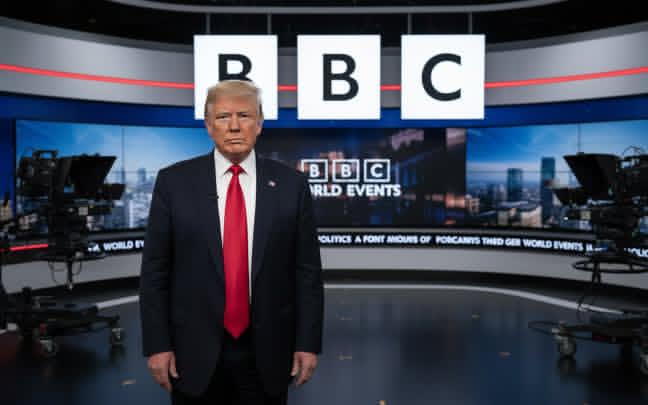CELEBRITY
JUST IN: Donald Trump Officially Files $1 Billion Lawsuit Against BBC, Accusing Network of Defamation and Deliberately Misleading the Public With Edited Jan. 6 Footage

Washington, D.C. — Former President Donald Trump has filed a $1 billion defamation lawsuit against the British Broadcasting Corporation (BBC), accusing the network of intentionally manipulating footage related to the January 6 Capitol riot in a way he claims “maliciously misrepresented” his actions and statements.
Filed early this morning in the U.S. District Court for the Southern District of Florida, the lawsuit represents one of the largest defamation claims ever brought against an international media organization.
Trump alleges that a recently aired BBC special on the January 6 attack included “deceptively edited” clips which portrayed him as endorsing violence, undermining U.S. democracy, and directing rioters — claims his legal team insists are “knowingly false.”
Trump Accuses BBC of “International Election Interference”
In the 142-page complaint, Trump’s attorneys argue that the BBC:
Removed key portions of his January 6 speech
Spliced together unrelated audio and video
Added narration that implied criminal intent
Presented commentary as fact
“Coordinated with hostile political actors” to damage Trump’s reputation globally
The lawsuit repeatedly describes the edited footage as a “political weapon” and claims the special was designed to influence American public opinion ahead of the 2026 midterm elections.
Trump himself issued a statement shortly after the filing:
> “The BBC knowingly aired fake, doctored footage to hurt me, to hurt my movement, and to mislead the entire world. They will be held accountable.”
BBC Responds: “We Stand by Our Reporting”
The BBC issued a brief but firm response, calling Trump’s allegations “baseless” and insisting the documentary was produced according to its long-established editorial standards.
A spokesperson for the network stated:
> “We intend to vigorously defend our journalism. The BBC’s reporting on January 6 has been accurate, extensively corroborated, and consistent with the findings of U.S. courts, congressional inquiries, and independent investigators.”
The broadcaster also emphasized that the documentary included publicly available footage, official transcripts, and expert analysis.
Legal Experts Say the Case Faces ‘Huge Hurdles’
While the lawsuit has drawn immediate global attention, legal analysts note that Trump’s chances of winning a $1 billion defamation claim against an international news organization are extremely slim.
Under U.S. law, public figures must prove:
The statements were false
The broadcaster knew they were false or acted with reckless disregard for the truth
Actual harm to reputation occurred
Media law professors describe the case as “aggressive,” “highly political,” and “unlikely to survive the first round of motions.”
One noted that Trump has repeatedly sued media companies but rarely prevailed.
Why Trump Claims the Footage Was Altered
The lawsuit highlights several specific complaints:
1. Omission of Trump’s call for peaceful protest
His lawyers argue the special failed to include the full segment where he urged supporters to “peacefully and patriotically make your voices heard.”
2. Editing to imply coordination with rioters
Trump alleges that audio from one rally was mixed with video from another event to “manufacture a narrative.”
3. Narration implying criminal wrongdoing
His team claims the documentary’s tone suggested Trump intentionally incited violence.
4. Use of expert commentary presented as fact
The suit argues the BBC treated opinion as factual findings.
Political Reactions Split Immediately
Republican lawmakers supportive of Trump claimed the lawsuit exposes “foreign propaganda targeting American elections.”
Democratic leaders dismissed the filing as “a baseless PR stunt aimed at rewriting history.”
Media watchdog groups warned the lawsuit could have a chilling effect on international journalism if pursued aggressively.
What Happens Next
The BBC is expected to file a motion to dismiss within the next 30 days. If the case proceeds:
Evidence requests could stretch over months
BBC journalists could be called to testify
Trump may be required to give a sworn deposition
International jurisdictional battles may emerge
If the case survives early legal challenges, it would become one of the most closely watched media lawsuits in modern history.
For now, the filing has reignited global debate over free speech, media responsibility, and the political legacy of January 6 — ensuring the controversy will remain in the spotlight for months to come.













